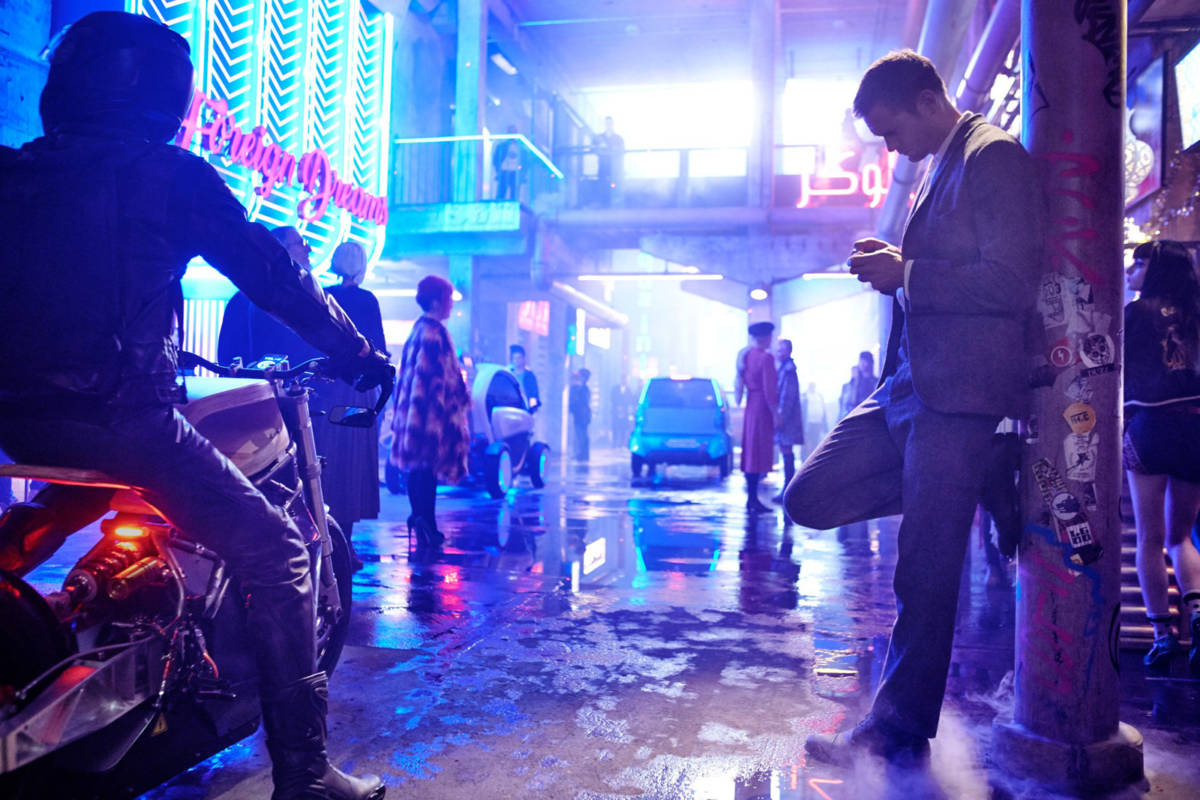Full disclosure: I consider Duncan Jones’ 2009 film Moon to be one of the better science fiction films of the last decade. Original, minimalistic, and a thought-provoking look at how, despite technological changes, humans inevitably don’t change all that much. Moon had a clear purpose and story to tell. While Jones’ following films following may have been less than stellar, Moon showed he is capable of crafting a unique, emotion-driven film.
And then there’s Mute, a film written and directed by Jones for Netflix that, please forgive me, should have stayed true to its title in that it has nothing of worth to say about anything.
Riding the coattails of recent neo-noir films and series’ such as Blade Runner 2049 and Netflix’s Altered Carbon, Mute’s similar futuristic setting lacks any of the nuanced storytelling that should be integral to these type of worlds. Set in a bleak Berlin where, despite numerous technological advancements, people seem content with visiting anything goes sex clubs and brothels. Oh, and you can order food by drone.
Alexander Skarsgård stars as Leo, a hulking bartender whose vocal chords were rendered useless after a childhood accident which left him mute. Leo has Amish roots and abstains from the technological amenities in which the rest of society now indulges. He leads a simple life, but it’s his love for his girlfriend, Naadirah (Seyneb Saleh) that the audience is made to believe is the center of his world. But when she mysteriously vanishes, Leo must make sacrifices regarding his faith to traverse this technological world to find her.
What unfolds is a two-hour slog of cliched, predictable, bizarre, and half-baked attempts to make the audience care about a group of mostly unlikable characters. Well, other than Leo, but he doesn’t have much to say, obviously. To deal with the reality of the film’s protagonist being mute, several other characters are introduced whose lives become intertwined with Leo’s, and not always for the better.
Most notable is that of Paul Rudd, who gives a performance far removed from his usual comedic roles, but efficiently demonstrates why he should stick to what he’s best known for. He plays a hyper-violent, AWOL medic named Cactus Bill, who stitches up mafia members in exchange for the long-promised passports for him and his daughter. Cactus is a perfect representation of Mute as a whole, in that there is no subtlety to him or virtually any other aspect of the film. Cactus rocks a 70s mustache, which he affectionately refers to as “The Tickler,” carries a massive bowie knife, and has his daughter frequently babysat by prostitutes while he’s out on “jobs.”
If he wasn’t comical enough to look at, his character is so over the top in his attempt at ham-fisted comic relief cut with fits of rage. His character is prominent in nearly half of the film, making up a majority of the dialogue, and giving the audience a behind-the-scenes view of how his and Leo’s worlds become intertwined.
And this is Mute’s most crucial flaw, in that the story it’s telling is just not as engaging as it thinks it is. Simplistic in nature yet convoluted in its construction to the degree that the viewer is mostly left confused by the introduction of numerous side plots that never really go anywhere. And worse yet, don’t compel the audience to care anymore about the world or its inhabitants.
There is a subplot in which Cactus discovers that his war buddy and ex-lover, Duck (Justin Theroux) is a pedophile. Cactus is enraged upon learning this, slamming Duck into a shelf and, given his propensity for violence, seems ready to kill him. This confrontation abruptly ends with Cactus answering his phone and having a conversation with another person only to announce to Duck that they’re leaving to celebrate the completion of his passports. And that’s it. His character seemingly just accepts that his partner is a pedophile, and despite being a father himself, never addresses it again.
It’s perplexing, abrupt, and its inclusion feels completely unnecessary. Unnecessary being how I would describe Mute, given the film’s lack of anything coherent or compelling to say. Even the futuristic setting is underutilized as a storytelling device, feeling mailed-in with the cliched dark and dingy neon-lit streets and subpar CGI hovercrafts. Mute’s world feels uninspired, and a stereotypical depiction of a future world where despite technological advances, gratuitous sex clubs and prostitution are the only things Jones thinks is worth showing us.
I honestly don’t believe that Mute suffered from being released within several months of Blade Runner 2049 or Altered Carbon, both of which were met with largely critical acclaim. I didn’t care much for Blade Runner 2049’s story but found its cinematography and world gorgeously hellish. Altered Carbon did an excellent job discussing the issues that come with technological advances. Mute fails to do either of these, if anything, well at all. It serves as further proof that if a director doesn’t have anything meaningful to say or show audiences then they should stay silent.
Some of the coverage you find on Cultured Vultures contains affiliate links, which provide us with small commissions based on purchases made from visiting our site.

